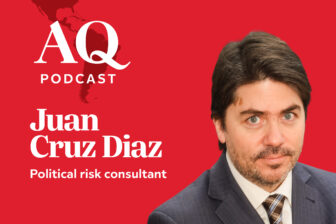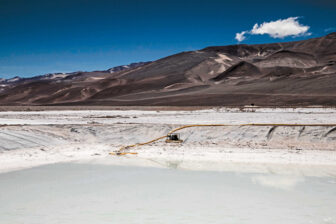BUENOS AIRES—As Argentina’s October first-round presidential election draws nearer, an insurgent force continues to disrupt the country’s political scene. Libertarian economist Javier Milei, a presidential candidate and federal deputy since 2021, has assembled a growing following with brash denunciations of the “political caste” and radical proposals like shuttering the country’s central bank, capturing popular discontent with the failure of both sides of the traditional partisan divide to address Argentina’s economic problems.
Public opinion surveys are far from being an accurate predictor of electoral results and in the case of Argentina, there is a wide variety in terms of the findings depending on the pollster. However, judging by some recent polling, Milei stands a real chance of winning the most votes of any individual candidate in the upcoming August 13 preliminary elections, or PASO, which will serve as a test of his support ahead of October’s first round.
He may win more votes than either Buenos Aires mayor Horacio Rodríguez Larreta or former security minister Patricia Bullrich, who will be competing against each other for the nomination of the main Juntos por el Cambio opposition bloc. Some polls suggest Milei’s party, La Libertad Avanza, could relegate the ruling Frente de Todos to third place in the August primaries. The October 22 first round may not replicate the outcome of the August primaries, but certainly, a third place in the PASO would be a nightmare for Peronism.
Milei’s rise has been the subject of much discussion, and anxiety, among both Argentina’s governing bloc and its main opposition. But what are his real chances of victory—and what are his prospects for governing, if he prevails in elections later this year?
If the presidential field is fragmented, as polls suggest, Milei stands a real chance of advancing to a runoff. If he makes it, his chances of victory will depend on his rival, among other factors. Milei has higher rejection rates than candidates from Juntos por el Cambio, but lower than most of the leading figures of the ruling Frente de Todos coalition—suggesting he would probably have a stronger chance against a government-aligned candidate.
Even if the Frente de Todos candidate is critical of current President Alberto Fernández, he or she will be held accountable by voters for the poor results of his administration, whose approval is at 13%. Peronism has a “floor” of 30% of the vote, but even if that is sufficient to make it to a second round, high rejection would likely doom its candidate in the runoff. Peronism, too, will be up against a recent regional trend against incumbent political forces.
Neither is it clear whether the eventual candidate will have the blessing of the powerful vice president, Cristina Fernández de Kirchner, whether there will be authentic internal competition in the August elections, or even whether there will be a consensus presidential candidate at all. More will be known by the end of the month, when all parties and alliances are required to present lists of the candidates who will compete in August.
Milei’s campaign has relied so far on criticism of the partisan establishment, grouping both Juntos por el Cambio and the Frente de Todos under a single label: “the caste.” Yet Milei is more comfortable attacking Juntos por el Cambio—refraining, however, from lambasting former President Mauricio Macri and Patricia Bullrich, with whom he shares some supporters. Milei likely believes that if Rodríguez Larreta wins the opposition primary, many Bullrich voters will support him in October and place him in a second round against the Frente de Todos candidate.
Cristina Kirchner has been recently mentioning Milei in her public appearances, suggesting she is seeking to exploit fear of the right to attract moderate independent voters who may feel uncomfortable with a run-off scenario in which they have to choose between Milei and Patricia Bullrich. With that in mind, despite the lack of results from his tenure, current economy minister Sergio Massa could make a stronger candidate than Wado de Pedro.
The five months left before the October 22 first round represent an eternity in Argentine politics, particularly given the frail economic situation. But the current scenario of economic decay benefits Milei’s attacks on the political establishment and adds to the mood of disenchantment that prevails among voters. A more volatile economic scenario, however, could lead some of Milei’s voters to support a candidate of the partisan establishment. In times of crisis, fear can be more powerful than anger when shaping voters’ preferences.
Milei at the helm?
Questions about governability could also take a toll on Milei’s support. The obvious question is how he will rule Argentina if he wins the election. Milei lacks a strong party organization behind him—something both the ruling coalition and main opposition do possess. Even if he does well in the first round, he will be far from a legislative majority in either house of Congress. Most of Milei’s agenda, which advocates changes in Argentina’s tax-sharing scheme between the federal government and the provinces, a sizable cut in public spending and the adoption of the U.S. dollar as legal currency, among other proposals, would require legislative support. His victory would seem to ensure a clash between the legislative and the executive branch.
Milei could try to promote his agenda through legislative decrees and non-binding referenda, both of which are allowed by Argentina’s constitution. But this strategy faces both legal and political obstacles. The constitution restricts the head of state’s ability to use legislative decrees, which can’t apply to issues of taxation, electoral and political party regulations or criminal law. Besides, Congress oversees and can overrule legislative decrees.
As for non-binding plebiscites, they also face certain restrictions: They cannot deal with matters that require qualified legislative majorities, voting in them is voluntary and their outcome can’t force Congress to act. Politically, plebiscites can backfire on the president—as presidents in Ecuador and Chile have recently learned.
A politically more viable alternative would be to build a government coalition gathering factions of Peronism that resist Cristina Kirchner’s leadership and the right-wing groups within Juntos por el Cambio that share affinities with aspects of Milei’s economic proposals. This might clash with Milei’s anti-system discourse, in which politicians in both major coalitions are seen as part of a “caste”—but it would allow him to advance at least part of his agenda and avoid an immediate governability crisis.
The rational approach would be the coalitional presidentialism path, a frequent resource for minority governments in Latin America. The fact that his provincial allies are minor figures from traditional parties indicates that, despite his narrative, he has no problem in having alliances with members of “the caste.”
But in the end, Javier Milei is another example of the blend of political populism and pro-market economics that has been so common in Latin America—and populist outsiders usually have a disdain for checks and balances. Milei might try to rule in a direct fashion at first, especially if he wins by a landslide in a run-off—only to turn to a more coalitional style once governability problems start to surface.
—
Labaqui is senior analyst at Medley Global Advisors and professor at the Universidad Católica Argentina.








